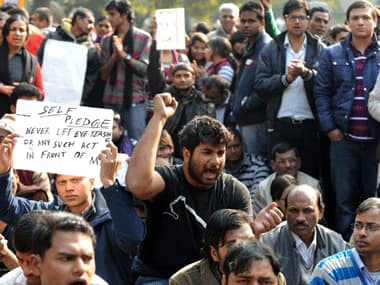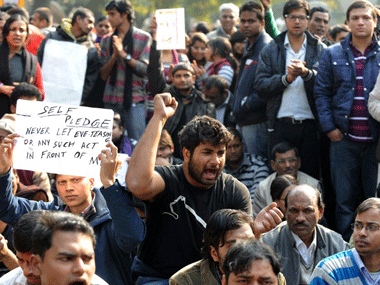New Delhi: A little over a month after the ban on the media to the report on the Delhi gang-rape trial was lifted by the Delhi High Court, a fast-track court hearing the case has barred foreign journalists from covering the proceedings. Last week, a British journalist was asked to leave the courtroom on the grounds that the High Court had permitted only reporters from ‘national dailies’ to cover the trial. On Wednesday, two more representatives of the foreign press were asked to leave after the public prosecutor, reiterating the High Court order, asked all reporters present in the courtroom to show their Press ID cards before the court proceedings begin. The foreign correspondents have now decided to seek a clarification from the High Court on the order lifting media ban. [caption id=“attachment_749981” align=“alignleft” width=“380”]  Protests following the December 16 incident of gangrape. AFP.[/caption] Speaking to Firstpost, Waiel S.H Awwad, President of the Foreign Correspondents’ Club, said, “We already raised the question with the Ministry. We will challenge the court order in a legal manner and find out what the best way is so that our correspondents are not discriminated against.” The Delhi gang-rape case, in which a 23-year-old student was brutally gang-raped and murdered and her friend attacked, has received unprecedented media attention both nationally and internationally, since it made headlines in December. Commenting on the media interest in the Delhi gang-rape case, Awwad said, “It is a human case. It is not any one particular country that wants to cover it. In fact, three correspondents were debarred from the court. If it is barred for everyone, it is fine. But there cannot be two standards. We respect the Indian system, but it should be clarified. We shouldn’t be denied when the High Court is allowing media to enter.” The controversy over the international media coverage has been over the name of the victim being published in some sections the press. Some of those examples were brought to the notice of the High Court during the hearings. Under Indian law, disclosing the name of rape victim is a punishable offence. Meenakhsi Lekhi, the lawyer who represented the Indian journalists, will be representing the foreign journalists as well. “We will seek a clarification and modification of the order. If foreign journalists seek to be bound by the same provisions in law as other Indian journalists, they should be given that opportunity,” said Lekhi. In March, the High Court gave media ‘calibrated access’ to the court proceedings of the Delhi gang-rape case after a group of Indian journalists challenged a media ban ordered by a lower court. As per the High Court order, access granted to “one representative journalist of each of the accredited National dailies” on the conditions that the name of the victim, family members, the complainant or witnesses are not published and the reportage will exclude parts of the proceedings that the court specifically so directs.
A little over a month after the ban on the media to the report on the Delhi gang-rape trial was lifted by the Delhi High Court, a fast-track court hearing the case has barred foreign journalists from covering the proceedings.
Advertisement
End of Article


)

)
)
)
)
)
)
)
)



